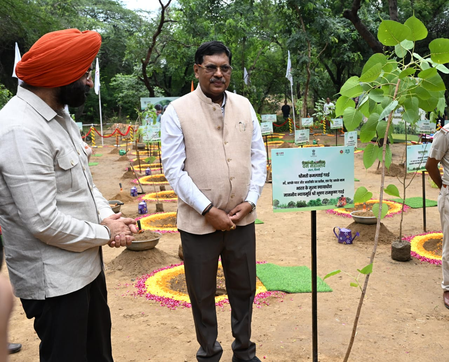
New Delhi, July 19 (IANS) Highlighting the importance of environment protection, Chief Justice of India (CJI) B.R. Gavai said on Saturday that protecting Delhi’s environment is a collective responsibility.
Addressing a gathering at a plantation drive organised by the Delhi government, the CJI said, “Development is important but we must understand the cost at which it comes.”
“Everyone starts getting worried as soon as October arrives… Forests, which are a part of humanity’s lineage, do not belong to us alone, they belong to future generations too. They play a vital role in reducing Delhi’s pollution,” he added.
CJI Gavai said that the Supreme Court has time and again stressed the importance of sustainable development and issued landmark advisories on pollution control.
Earlier the CJI, along with 20 judges of the Supreme Court, took part in the Delhi government’s mega plantation drive under Van Mahotsav 2025 at Delhi Ridge.
The judges were accompanied by Delhi Environment Minister Manjinder Singh Sirsa.
Minister Sirsa said that the presence of the CJI and other judges under Prime Minister Narendra Modi’s ‘Ek Ped Ma Ke Naam’ campaign reinforces the message that we must come together to restore Delhi’s green cover and reclaim clean air.
He added that it was an emotional moment for all the judges and for the Delhi government officials when judges planted saplings in the name of their mothers.
“The spot where the CJI and other judges planted the saplings will be developed as Nyay Vatika,” Sirsa told IANS.
Minister Sirsa described the participation in the Van Mahotsav 2025 by the CJI, along with his spouse, as a big achievement for the city’s fight against pollution.
“The CJI’s presence shows the importance that he gives to every single tree,” he said.
On Friday, embracing the spirit of ‘Ek Ped Maa Ke Naam’ launched by Prime Minister Narendra Modi, Chief Minister Rekha Gupta planted saplings.
On the occasion, she urged residents of Delhi to take part in the movement by planting more trees in their homes, neighbourhoods, schools, workplaces and community spaces.
–IANS
rch/khz



